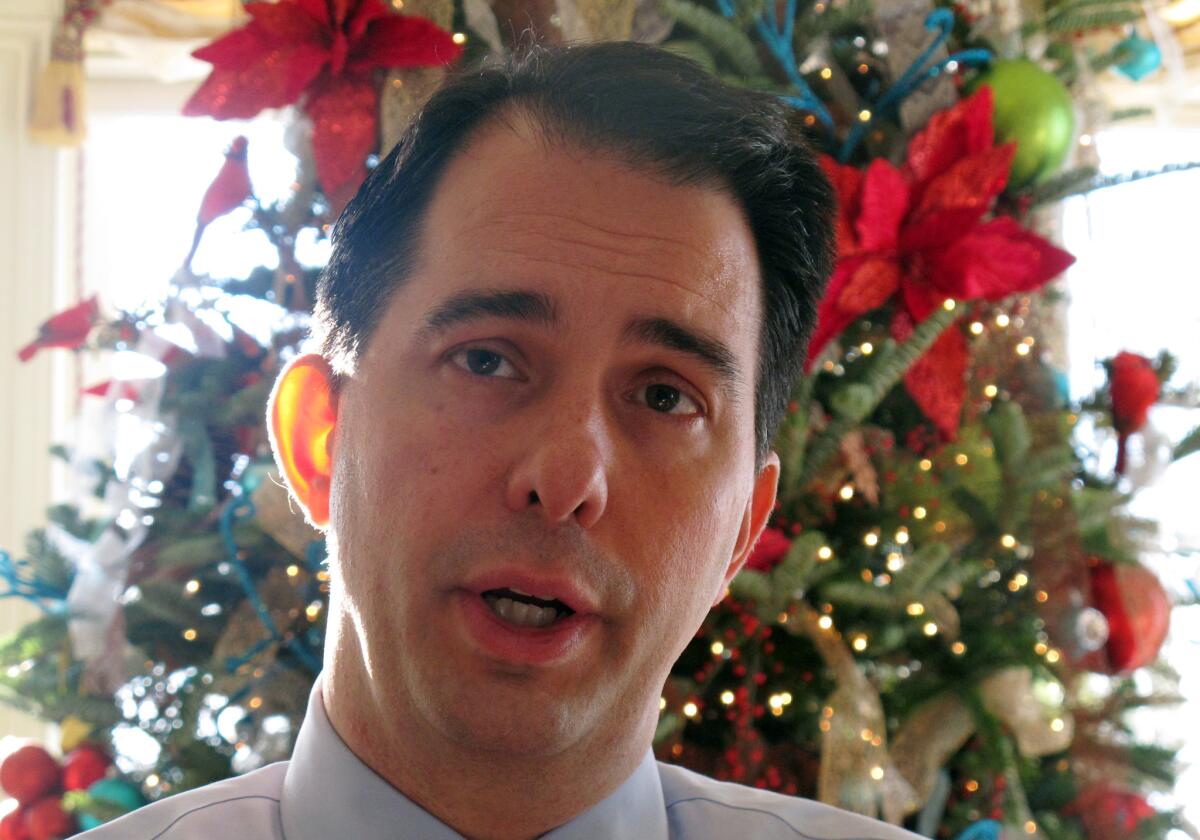Gov. Walker follows ‘Duck Dynasty’ into whirlpool over free speech

- Share via
For those of you who think that insensitive speech is just an issue for reality television and “Duck Dynasty,” consider Wisconsin, where Gov. Scott Walker has quietly signed a bill that will make it harder to force public schools to drop tribal nicknames.
The measure, pushed by GOP lawmakers and signed by the Republican governor on Thursday, makes it more difficult to get a state review on whether a school or team nickname is offensive to some groups. The measure also eliminates pending state orders to drop racially or ethnically based mascots.
The mascot issue reaches all the way to the nation’s capital--where some Republicans speculate Walker has set his future political sights. Whether to rename the Washington Redskins, whose name offends many people, was an issue in this less-than-stellar football season for that team. Even President Obama weighed in, saying that if he were the owner of the team, he would consider changing the name because it offends many Native Americans.
Like the “Duck Dynasty” dispute, or the recent fight over renaming a Florida school honoring a founder of the KKK, the Wisconsin fight raises the question of among some people as to whether there is a blanket protection of speech, even when it is hateful to some people.
Walker, who survived a union-led recall effort in 2012, has been signaling for days that he was wrestling with the bill. He finally signed the measure privately and released a statement saying he worried about the free speech implications. Just being offensive doesn’t overturn the constitutionally protected right to speak out, he said.
“If the state bans speech that is offensive to some, where does it stop?” Walker wrote. “I personally support moving away from nicknames or mascots that groups of our fellow citizens find seriously offensive, but I also believe it should be done with input and involvement at the local level.”
That argument didn’t placate opponents.
“When we tell our children that it’s okay to stereotype an entire race of people, it’s just plain bad educational practice,” Barbara Munson with the Oneida Nation, told reporters. She estimated that 30 school districts still use Indian mascots and symbols.
The Wisconsin controversy comes during a high-profile battle over the reality television show “Duck Dynasty,” whose patriarch, Phil Robertson, 67, was suspended after remarks in the January issue of GQ magazine calling homosexuality a sin and placing it in the same category as bestiality and promiscuity.
The Robertson family rallied and in a statement this week, defended Phil.
“While some of Phil’s unfiltered comments to the reporter were coarse, his beliefs are grounded in the teachings of the Bible. Phil is a Godly man who follows what the Bible says are the greatest commandments: ‘Love the Lord your God with all your heart’ and ‘Love your neighbor as yourself.’ Phil would never incite or encourage hate,” the Robertsons said in a statement. “We are disappointed that Phil has been placed on hiatus for expressing his faith, which is his constitutionally protected right.”
The Robertsons have picked up support from conservative politicians, including some who, like Louisiana Gov. Bobby Jindal, is a potential national rival of Wisconsin’s Walker. For some conservatives the issue was a more than a question of free speech; it was part of what they perceive as a continuing culture war with liberals who condone a vision that conservatives often view as anti-religious as well.
The Wisconsin law, signed by Walker, amends a 2010 state law that required Wisconsin’s Department of Public Instruction to hold a hearing on a school’s race-based nickname if the agency received a single complaint. The 2010 law placed the burden on the school district of proving the nickname wasn’t discriminatory.
ALSO:
‘Affluenza’ in Texas incites anger, lawsuits and call for jail time
Reno hospital shooter claimed to have ‘adverse symptoms’ from surgery
Michigan man to face murder trial in shooting of woman on his porch
More to Read
Sign up for Essential California
The most important California stories and recommendations in your inbox every morning.
You may occasionally receive promotional content from the Los Angeles Times.











